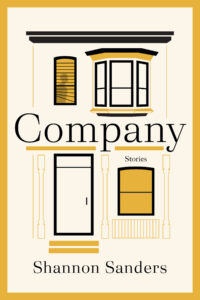Hannah Grieco, editor-in-chief of the ASP Bulletin, interviews author Shannon Sanders about her exciting new short story collection Company, from Graywolf Press
Hannah Grieco: Tell us about Company!
Shannon Sanders: Company is a collection of thirteen linked short stories, most of them centered on the members of one multigenerational Black family. The stories tackle lots of different subjects, but they share a common element: Each one involves an interaction between a guest and a host. (Hence the title!) The stories jump around to center different protagonists, but—and this is what I love most about linked collections—a character you've gotten to know in one context is likely to reappear on the fringes of another character's story.
HG: Why a short story collection vs a novel? What do you love about the short story form?
SS: I'm debuting with a short story collection because for a period of several years, short stories were what I was writing—and pretty compulsively at that! I was obsessed with the idea of trying to capture a particular scene or moment or feeling and imbue it with meaning within the limits of the short story frame. Before I had kids (meaning I had a lot more time for my mind to wander), short story ideas kept coming to me, and it was really satisfying to be able to put them on paper. Some of the stories I wrote in only one or two sittings. I got massively lucky in that my agent, Reiko Davis, believes in short stories and was excited to seek a home for these ones without pressuring me to try to write a novel.
That said, I love novels too—I was raised on them—and am hard at work on my first one!
HG: This collection is so beautifully linked, with characters (and their needs) intersecting throughout. Was that hard to pull off? How did you plan and organize the collection? Was ordering the stories difficult?
SS: Thank you for those lovely compliments! I will be honest: I think linked short stories are easier in many ways. To take a step back (I promise it will make sense), some of my earliest writing efforts were in teenage fanfiction, which I think is a great learning experience because so much of the material is pre-cut and the writer doesn't have to worry so much about building the world from scratch. It leaves a lot more room to play and experiment. When I was writing fanfic in high school, I was able to get a lot of good story-shaping and sentence-level practice, because I already understood the characters and the setting so well.
In much the same way, the more of these stories I wrote, the deeper and realer the world became. By the time I was putting the finishing touches on the collection, every character in the book felt human to me. I was no longer guessing what they would do or say; I knew. I understood how they would intersect because we'd spent so much time together already.
Ordering the stories felt daunting at first (because I knew it was important to get it right), but in the end they ordered themselves. I wanted the reader to have a particular experience of discovering these characters and then growing to understand each one better as the perspective shifted. Though I hear that lots of readers skip around when they read collections anyway!
HG: Can you talk a little more about that organization process? Was there a timeline in your head? How did you go about deciding what story went where?
SS: Ordering the pieces was not nearly as complicated as I had worried it would be! My agent and my editor were fairly decided that the PEN-prizewinning story should go first; I felt that a story that ends on a hopeful note should go last. I took a wonderful One Story class with Patrick Ryan in which he discussed ordering collections, and I had learned a few tricks about positioning some of the heavy-hitting stories (in my cases, the longer, more exposition-rich ones) to hold reader attention. And then finally, I tried to make the reader experience fun and revelatory wherever I could! So that, for example, a reader who remembered the mention of Cy Collins in the second story (in which he's just a voice on the telephone) would be excited to catch up with him ten years later toward the end of the book in the story of which he's the star.
HG: When did you begin to realize that you were writing a collection, vs just a story or two with related characters? What was your writing process like, once you decided to write an entire book this way?
SS: I have a wonderful friend, Jen Buxton Haupt, who was my first-ever workshop leader and writing teacher. She read my first few workshop stories, most of which were linked, and started publicly telling people that I was working on a book. I think that's probably what planted the seed! I kept adding stories to the same linked universe for years—not because I thought I was working on a book, but because I found that it was so easy to generate material that way! Every time I introduced a peripheral character in a story, I found that I was really excited to explore that character further, give them even more focused attention. As an example, the first story in the collection ("The Good, Good Men"), which is also one of the first ones I wrote chronologically, features a character named Lela. Shortly after I wrote that one, I found that I wanted to delve into Lela's childhood, so I wrote another story, which ended up being the title story and an anchor to the collection.
I wrote about four of the stories after connecting with my agent, who felt there should be a few more stories touching on a little bit of additional material. The better I knew the characters, the easier the stories were to write! So the ones that came toward the end of the process (which are interspersed throughout the book) felt less like generating new material and more like filling in gaps.
HG: Were there any stories you cut from the collection? Why?
SS: No, but I did have to make a couple of tough decisions about not including stories that were a little bit too resonant with others in the collection. I think a lot of writers find ourselves doing accidental rewrites—coming up with the same story in different ways because we're obsessed or because we feel we left some stone unturned last time! That happened to me a couple of times, and I knew I had to keep the collection tight and succinct.
HG: What was the hardest story to finish, and why? Were there any stories you almost gave up on?
SS: I don't want to suggest that I'm an effortless writer, but I did not have any pulling-teeth experiences while writing this book! But I did have to do a little bit of story surgery on two of the shorter pieces in the collection: "Rule Number One" and "Three Guests." They were, at one point, a single story overloaded with an awkward combination of backstory and forward movement. My editor very gently coached me to streamline the story, but I really wanted to keep most of the material. So I ended splitting up the paragraphs (non-sequentially) and creating two stories, then suturing on a little bit of extra tissue for polish. (It sounds gross! I hope no one perceives it in the reading.)
HG: For those of us who also write stories vs longer works: How did you go from writing for literary journals to getting an agent and landing Graywolf?
SS: In early 2020, my debut short story "The Good, Good Men" won a PEN/Robert J. Dau Short Story Prize for Emerging Writers. Winning that award (for which I had asked Puerto del Sol to nominate me—writers, don't be shy about doing this!!) truly changed everything for me. Reiko (who would eventually become my agent) follows those awards; after she read my story, she found my other work online (writers, keep your website up to date!!) and reached out to me. To my absolute delight, she was excited about trying to sell a short story collection and had some great ideas about where to do so.
I was prepared for the possibility of multiple submission rounds, but it went to auction almost immediately and I fell in love with Graywolf's vision for it.

Shannon Sanders lives and works near Washington, DC. Her fiction has appeared in One Story, Electric Literature, Joyland, TriQuarterly, and elsewhere, and was a 2020 winner of the PEN/Robert J. Dau Short Story Prize for Emerging Writers.


